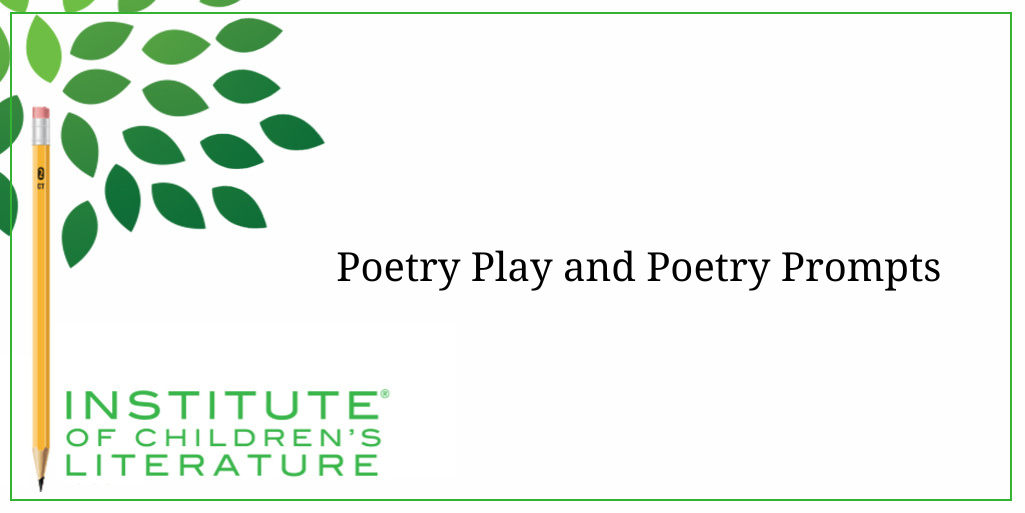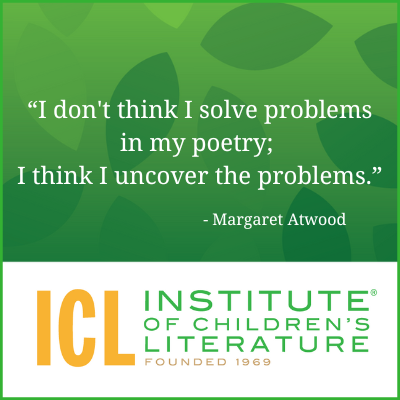
5 Ways Writers Can Prep for 2025 Goal Setting
Before we roll on to the new writing year, let’s harness our optimism for the blank slate before us and prepare for our 2025 Goal Setting just for writers.

We teach our students how to write and get published!
View our Course Catalog >
The fog comes
on little cat feet.
It sits looking
over harbor and city
on silent haunches
and then moves on.

Suppose we wanted to try a similar sort of metaphorical poem. Say, for instance, I wanted to write a poem that compares volcanoes and dinosaurs. What things could I see that are the same about them? They are both terrifying for people to encounter. I could imagine both of them making huge sounds. They can be still or move fast (at least lava can). They are both ancient. With that comparison, I quickly come up with this:
Eruption
A mighty roar
The beast awakens.
Ancient
Fierce.
Racing fast and hungry
People flee the fiery bite.
Never full
It eats their homes instead.
In this opening stanza, I don’t bluntly tell the reader that I’m writing about volcanos or dinosaurs. In fact, I’m never completely clear that my comparison is to dinosaurs. It could be anything fierce and monstrous. The second stanza is more specific, focused on speed and hunger to capture the feeling of fear that could come from being chased by a dinosaur or by lava. I never say that I’m writing about a volcano outside of the title, “Eruption.” So, for a poetry prompt, consider comparing some force of nature to some kind of creature. How is a cloud like a panda? How is an iceberg like a whale? What comparisons can you make through a poem?
Write a poem about a place. It can be somewhere big like a city or somewhere small like the shadowy ground under a tree. Include specific, physical details to make the place real for the reader. Place poems can also be metaphorical, by the way, so if you had great fun with the poem with a force of nature and a creature, consider trying one where you compare a specific place to a creature. What creature is your town like? What creature does Paris remind you of, or New York, or Las Vegas? If all these great cities were in a dog show, what dogs would they be? The more you practice metaphorical poems, the better and more unique your comparisons will become in poetry or prose.
Flip through photos of people in a stock photo collection until you find one of a person whose look inspires you and write a poem about that person. Perhaps your poem would “see” the things they’ve been through in the lines and angles of their face. Or perhaps your poem would see something revealing in their expression. Or maybe you could capture a single moment of their life in a poem. This kind of poem can be part of your character-building exercises as it helps you find specific memorable things about the characters you create.
Write an informational poem about a scientific phenomenon. Choose something unusual, beyond the more expected choices of “rain” or “clouds.” Instead, consider focusing on something more unexpected like black holes or tornadoes or how a bridge is built. This kind of informational poem usually focuses on a single fact or a few related facts about the subject but presents the information in a new and interesting way.
Choose a word you especially like the sound of, one that is delicious to say and build a poem around it so that the word makes perfect sense with everything else around it.
Take on any one of these poetry prompts and allow the creativity to flow. No judgment allowed, only fun!
With over 100 books in publication, Jan Fields writes both chapter books for children and mystery novels for adults. She’s also known for a variety of experiences teaching writing, from one session SCBWI events to lengthier Highlights Foundation workshops to these blog posts for the Institute of Children’s Literature. As a former ICL instructor, Jan enjoys equipping writers for success in whatever way she can.

Before we roll on to the new writing year, let’s harness our optimism for the blank slate before us and prepare for our 2025 Goal Setting just for writers.

Writers can be thin-skinned when it comes to getting feedback on their work. Let’s look at 4 ways to positively deal with constructive criticism!

Rejection is part of the territory when it comes to being a writer. Today we offer reflection for writers to help redirect your efforts after a rejection.
1000 N. West Street #1200, Wilmington, DE 19801
© 2024 Direct Learning Systems, Inc. All rights reserved.
1000 N. West Street #1200, Wilmington, DE 19801
© 2024 Direct Learning Systems, Inc. All rights reserved.
1000 N. West Street #1200, Wilmington, DE 19801
© 2024 Direct Learning Systems, Inc. All rights reserved.
1000 N. West Street #1200, Wilmington, DE 19801
© 2024 Direct Learning Systems, Inc. All rights reserved.

1000 N. West Street #1200, Wilmington, DE 19801
© 2025 Direct Learning Systems, Inc. All rights reserved.

1000 N. West Street #1200, Wilmington, DE 19801
©2025 Direct Learning Systems, Inc. All rights reserved. Privacy Policy.